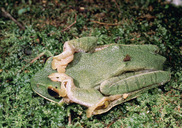|
Description
A large tree frog. M up to 73 mm, F up to 81 mm. Snout vent length is 43-73 mm in males and 68-81 mm in females. Back color is live green, green-grey or brownish, sometimes with brownish spots (especially in females); in preservative violet. Flanks often marbled. A distinct white line along the upper lip and white lateral fringes along lower arm and tarsus was observed. Legs are with indistinct dark bands. Venter is whitish to yellowish. The iris is light brownish to greyish. Skin on the back is smooth or partly granular on head and neck, very granular in males during the reproductive period. Nostrils are equidistant between tip of snout and eye. Tympanum/eye ratio is about 1/2. Tibiotarsal articulation reaches tip of snout. Webbing of the hand
1(1), 2i(1), 2e(0), 3i(1), 3e(0), 4(0); foot completely webbed. Males are
found with a large prepollex, nuptial pads on 1. and 2. finger and a paired
subgular vocal sac. Breeding males have large tubercles covering most of dorsum, and with black keratinized spiiny tubercles on throat and chest.
Similar species: Other large Boophis (e.g. B. goudoti,
B. opisthodon) are not green and have much less webbing on the hand.
B. luteus and B. elenae have no white band along the upper
lip.
Distribution and Habitat
Country distribution from AmphibiaWeb's database: Madagascar
Ambatolahy forest, An’Ala, Andapa, Andasibe, Andohahela, Andrakata, Andringitra (Iantara river, Sahavatoy river), Anjanaharibe, Benavony, Brickaville, Ifanadiana, Ivohibe, Manongarivo, Marojejy, Ranomafana. It occurs between
100- 1,000m asl in moist rainforests, including slightly disturbed habitats and isolated gallery forests (Nussbaum et al. 2008).
Life History, Abundance, Activity, and Special Behaviors
Habits: Calling specimens were observed at night in very slow-moving water,
Adult specimens were found in vegetation near streams in primary forest.
Calling males were heard in August and March. They were sitting about 3 m high
in vegetation, sometimes upto 30 m away from the stream. The intestine of one
female contained remains of insects (probably coleopterans and heteropterans).
Eggs: One gravid female from Benavony with snout vent length 68 mm found in March contained 421 eggs of about 2.5 mm diameter, which were yellowish with a
blackish cap.
Breeding takes place near streams and small trickles of water (Nussbaum et al. 2008).
Trends and Threats
It occurs in many protected areas (Nussbaum et al. 2008). Possible reasons for amphibian decline General habitat alteration and loss
Habitat modification from deforestation, or logging related activities
Intensified agriculture or grazing
Urbanization
Habitat fragmentation
Comments
Taken with permission from Glaw and Vences (2007).
References
Glaw, F., and Vences, M. (2007). Field Guide to the Amphibians and Reptiles of Madagascar. Third Edition. Vences and Glaw Verlag, Köln.
Nussbaum, R., Cadle, J., and Glaw, F. (2008). Boophis albilabris. In: IUCN 2008. 2008 IUCN Red List of Threatened Species. www.iucnredlist.org. Downloaded on 08 April 2009.
Originally submitted by: Miguel Vences and Frank Glaw (first posted 2002-04-16)
Edited by: Henry Zhu (2010-07-19)Species Account Citation: AmphibiaWeb 2010 Boophis albilabris <https://amphibiaweb.org/species/4328> University of California, Berkeley, CA, USA. Accessed May 31, 2025.
Feedback or comments about this page.
Citation: AmphibiaWeb. 2025. <https://amphibiaweb.org> University of California, Berkeley, CA, USA. Accessed 31 May 2025.
AmphibiaWeb's policy on data use.
|
